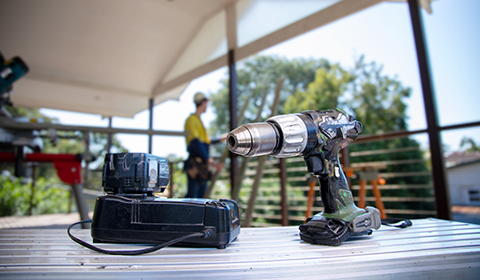
What are li-ion batteries?
Li-ion batteries are rechargeable batteries that can store more energy in less space than traditional batteries. They are also more lightweight and compact than other batteries. Li-ion batteries:
- power most household rechargeable devices like mobile phones, laptops, power tools, vacuum cleaners, children’s toys, e-scooters and e-bikes
- come in a variety of shapes including cylindrical, flat and rectangular
- will have some form of marking on the device containing any of the following words: ‘lithium-ion’, ‘Li-ion’, ‘li-po’, ‘lithium-polymer’ or ‘Li+’
- should always be charged according to the manufacturer’s instructions and should never be used if they are damaged or defective.

What are the risks of li-ion batteries?
If used incorrectly, li-ion batteries can be dangerous. Know the risks of li-ion batteries:
- When damaged, exposed to heat sources or charged inappropriately, batteries could catch fire or, in extreme cases, explode.
- Continuing to charge after the battery is full can increase the risk of the battery catching fire.
- When overheated or on fire, li-ion batteries can create a highly toxic vapour cloud.
- These fires are hard to put out with water or a fire extinguisher. Re-ignition is likely to happen – even if the fire seems to be extinguished.

How to charge safely
Do
- Only use battery chargers that are specifically recommended by the manufacturer as being suitable for the battery or device.
- Only use chargers with the correct voltage and current for the device.
- Check that chargers bear the Regulatory Compliance Mark, to show they have met the relevant Australian Standards under The Regulatory Compliance Mark (RCM)(General) – EESS.
- Ideally, they should be charged in a well-ventilated area such as a garage or car port.
- Allow time for batteries to cool down after use and before recharging.
Don't
- Avoid leaving batteries or devices unattended while charging and once the battery is fully charged, disconnect it from the charger.
- Devices and equipment containing li-ion batteries, such as power tools and e-scooters should not be charged in living areas.
- Do not store batteries or devices in areas where they may be exposed to heat or moisture.
- Do not charge batteries or devices on bedding, lounges or in direct sunlight or other sources of heat.
- Do not leave batteries or devices in parked vehicles where they can quickly heat up.
- Never charge a battery or device that is showing signs of damage or is hot.
How do I dispose of li-ion batteries?
Disposal – damaged batteries
- Li-ion batteries with any sign of damage, that have had water or liquid ingress, or that have been exposed to salt-water should be treated as damaged and highly dangerous.
- Contact your local council urgently to ask how these batteries should be disposed of in your local area.
- Never dispose of damaged li-ion batteries or devices in general household, recycling, public or industrial bins, as damaged li-ion batteries can cause fires.
- Do not put discarded, damaged li-ion batteries or devices in piles.
- Wear personal protective clothing and equipment when handling damaged batteries or devices.
- Be aware of the risks related to damaged li-ion batteries, including electric shock, secondary fire risks, and exposure to toxic, corrosive, and flammable vapours and substances.
- Fire or smoke-damaged batteries should be kept outside in a well-ventilated area and stored 10m from any other dangerous goods or materials that are combustible or flammable.
- Place leaking or damaged (but not overheated or off-gassing) batteries in a clear plastic bag or container.
- If you need to transport damaged lithium-ion batteries or devices refer to the ADG Code for more information on how to package them for transport.
Disposal – undamaged batteries
- Never dispose of li-ion batteries or devices in general household or recycling bins.
- Never dispose of li-ion batteries or devices in industrial bins.
- Do not put discarded li-ion batteries or devices in piles.
- Contact your local council for instructions about how to discard or recycle lithium-ion batteries in your area.
- Tape over battery terminals with electrical tape before giving them to a disposal or recycling facility.
What to do if a fire or emergency occurs – Call Triple Zero (000) immediately if fire or smoke is evident
Fire or smoke
If your li-ion rechargeable device is on fire, or smoke is coming from it:
- Call Triple Zero (000) immediately and report the incident.
- Don’t touch a damaged battery or device – severe burns could occur.
- Raise the alert and ensure everyone evacuates to a safe area.
- Don’t breathe the air around the battery or device – it will likely contain toxic vapours.
No fire or smoke
If your li-ion rechargeable device is creating an unusual smell or sound, developing heat, changing shape or behaving abnormally, and it is safe to do so:
- Disconnect the device from the power supply.
- Move the device outside away from any other combustible items.
- Submerge the battery in a bucket filled with cool water to prevent ignition or further ignitions, until emergency assistance arrives.
FAQ
How do I know if my electric scooter meets standards?
Visit the Queensland Government Electrical Safety website for information on how to check if your electric scooter meets standards. https://www.electricalsafety.qld.gov.au/electrical-equipment/using-and-charging-electric-scooters
I want more information on Battery Energy Storage Systems (BESS)?
Visit the Queensland Government Electrical Safety website for information about Battery Energy Storage Systems (BESS) https://www.electricalsafety.qld.gov.au/electrical-safety-home/battery-energy-storage-systems
I want to know more about what the Australian Government is doing regarding Li-ion batteries?
The Australian Competition & Consumer Commission has launched a report seeking to demonstrate the importance of safe battery supply and design to support consumer confidence in the safety of Li-ion products. Find out more: https://www.accc.gov.au/about-us/publications/lithium-ion-batteries-and-consumer-product-safety
Where can I recycle my Li-ion batteries?
Information on battery recycling and safe disposal can be found at www.recyclemate.com.au or www.bcycle.com.au.
